Prompt 303. Hot Peppers & Radical Acceptance
& Laura McKowen on the wisdom of no escape
Hi friend,
A few weeks ago, at a medical appointment, I was discussing my mindset around resuming chemo with one of my favorite nurses—one who cared for me when I was diagnosed with leukemia at twenty-two, then again two years ago, and now a third time—and she said, “You seem weirdly calm.”
I replied, “I feel weirdly calm.” And it’s true. At first, I thought I was in shock or maybe even denial—and sure, there’s probably a little of both. But mainly, I think I feel calm because I’ve accepted my circumstances. It’s taken me a long time to get here. Over the last thirteen years, I’ve raged against the realities and limitations of illness. I’ve stewed in self-pity. I’ve fallen into the comparison trap, envying others who don’t have to endlessly deal with such health conundrums. I’ve numbed myself to my reality, binge-watching bad TV and indulging other means of escape. But the fact is, that illness and its imprints have been a constant specter in my adult life, and as much as I may want to, I can’t look away. Illness and its attendant complications—everything from doctor’s appointments to uncertainties about the future—are simply here. It is what it is, and no amount of avoidance gymnastics will change it.
That’s not to say I don’t feel fear—of course, I do. But strangely, the anticipation of pain can be far scarier than just being in it, actually confronting it. After my first transplant, in the years when I was cancer-free, I felt hijacked by the prospect of a recurrence and afraid that I wouldn’t be able to handle it. When it actually happened, I faced it. Knowing that, I have been trying to practice a kind of radical acceptance of whatever comes up, responding with whatever the situation calls for.
Take last weekend, for example. On Saturday, I had to go in for my last infusion of my second round of chemo. The side effects compound day-to-day, and afterward I felt awful, and I knew I’d be spending the day in bed. It had been a rainy morning, but on my way home, the sky began to clear, and I beheld a spectacular rainbow. For a moment, I glimpsed a sense of wonder. When I got to my room, I said to myself, “If I have to be in bed all day, so be it. What can I do to make this a little less miserable?” I took some anti-nausea meds and got a big glass of water. I put on my favorite face oil, wrapped myself in a heating pad, gathered my pups around me, and queued up some favorite old movies to watch. Did I still feel awful? Yes. But instead of fighting it, or lamenting all of the things I wouldn’t be able to accomplish that day, I accepted it. And it turned out that staying in bed all day felt almost luxurious.
Then came Sunday, and I felt a little better—good enough to get up for a couple of hours and spend some time in the sun. My mom was visiting, and my friends Cat, Jonny, and Liz came over to pick peppers from our garden and make homemade hot sauce. It was a perfect early autumn day, with all three dogs snuffling around outside the fence of the vegetable patch. (Outside because Sunshine seems not to understand that peppers are not a suitable snack for a pup.) Afterward, everyone got to chopping the peppers and jarring them for fermentation. By the end, I was so tired that I didn’t make it to dinner—I went to bed hours before everyone else—but I was sated by the good hours I’d spent.
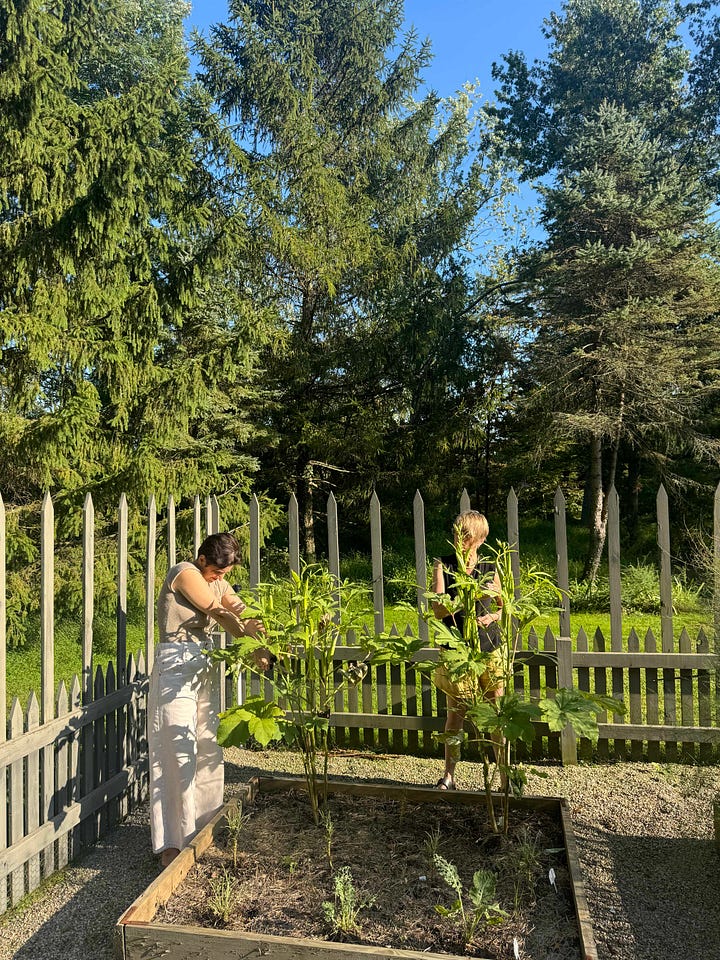
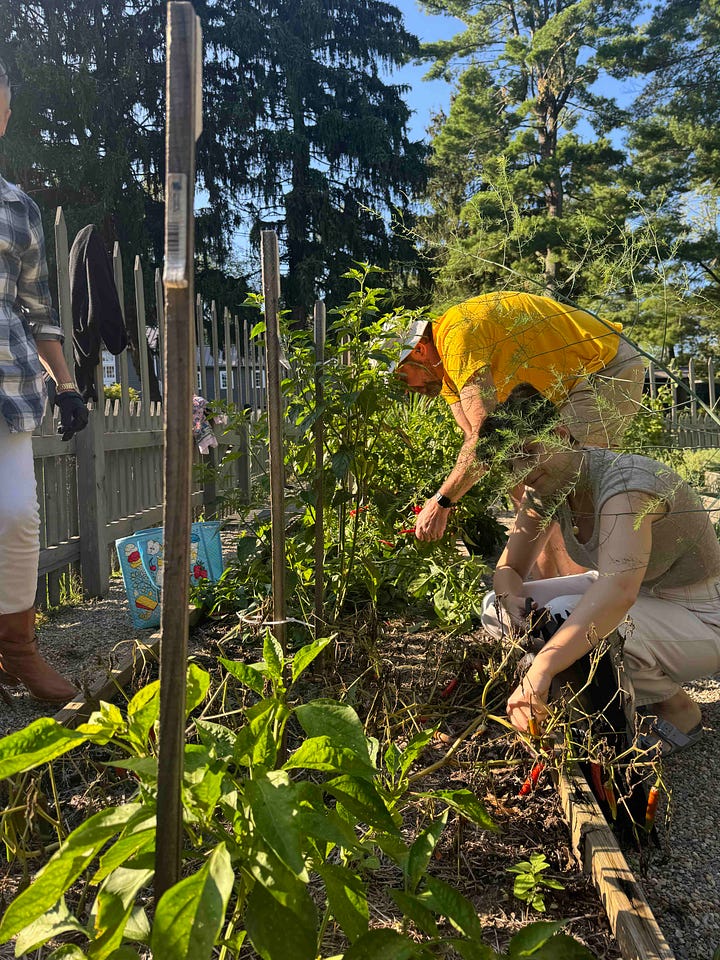
Earlier this summer, days after I learned I was going back on chemo, I was drinking coffee on the porch with my dad. He said that somehow he felt there would be a miracle—that someday all this would be behind me and I would be well. I understood the impulse, especially for a parent. And would I like a miracle cure? Sure. But I can’t anchor my sense of well-being in some future unknown, be it a miracle or something else. It doesn’t bring me comfort to hope for something that’s so far out of my control. I need to stay within what I can control, and what’s in my control is how I feel right now, how I live my life right now. And my life right now is good. It’s good despite illness. It’s maybe even good because of it—because of how it has clarified what I value and rerouted my priorities.
I’ve been thinking recently that the people I admire most are not those who bend reality to their will, but who accept it and find creative ways to engage with it. I think that’s my definition of resilience: to accept what’s happening moment to moment, and to allow for necessary adjustments, to pivot, to find relief, to cultivate small joys. And in that same vein, I try to plant seeds for future joys, for things to look forward to—like next weekend, when our tabasco peppers will be ripe for the picking.
With that, I’ll turn to today’s essay and prompt, called “The Wisdom of No Escape” by the inspiring
. It’s a powerful meditation on what happens when we stop running from discomfort, when we summon the courage to stay present—to welcome whatever the day, the hour, the moment will bring.Sending hot, hot, very spicy love,
Suleika
Some items of note—
Our next meeting of the Hatch, our virtual hour for paid subscribers, is happening today—that’s Sunday, September 15, from 1-2pm ET. The Isolation Journals managing editor, Carmen Radley, will be hosting this time, reflecting on the joy of poems that call you back (and stories and paintings and music too). Find everything you need to join us here!
In case you missed it, I sent out a video replay of our artist talk for “The Alchemy of Blood,” my joint exhibit with my mom, Anne Francey. In it, we talked about how these works came into being, and Anne gave us some mic-drop moments that left us all in awe. I hope you get a chance to watch it, and also to see the show, which is up until October 6 at ArtYard in Frenchtown, NJ!
Prompt 303. The Wisdom of No Escape by Laura McKowen
Earlier this spring, my four-year relationship ended. We were engaged and planned to get married this fall. This was the first significant relationship I’ve had since my marriage, which ended over ten years ago. Back then, I was so deep in my addiction and cut off from my heart that I felt nothing but relief when my ex-husband and I finally split. I kept waiting for the grief to hit me like people said it would, but it never did. I’d long been praised for my positivity and strength and courage, and I thought this was more proof of my resilience.
This time, I’ve fallen apart completely. For months I’ve struggled to work. I’ve had panic attacks, waves of pain so strong I’ve had to lie down on the kitchen floor or pull over on the highway. There have been countless sleepless nights and many days I’ve been unable to get out of bed. I’ve been stunned at how much I’ve cried, and how quickly it comes on. I’ve been enraged, jealous, confused, sad, and indignant all in the same hour.
What I haven’t done, though, is drink. I actually haven’t had a drink in almost ten years, so this isn’t new, but it’s still something. More interestingly, I haven’t wanted to drink. This is its own miracle, but even more incredible to me is I’m not doing anything else destructive, either. What I learned pretty quickly in sobriety was that alcohol was just a symptom. Once it was removed, I found other ways to escape: work, food, productivity, achieving, sex, and the big one for me, love, or the pursuit of it. The problem, it turned out, was not alcohol—it was that I couldn’t be present for my pain. And I literally mean it when I say I couldn’t. I had no skills or tools to stay with myself, and it’s taken ten years to build that inner safety.
As I’ve been moving through these months, I’ve often thought of renowned Buddhist teacher Pema Chödrön, and what she had to say about “the wisdom of no escape,” which she says is “an alternatingly painful and delightful ‘no exit’ situation.” According to Buddhist principles, in seeing ourselves, our emotions and thoughts, exactly as they are right now, and in not trying to make them go away or improve or change them, we have the opportunity to befriend ourselves and cease suffering. This no-escape witnessing, when we can do it with “precision and gentleness” (the gentleness is key), holds our innate wisdom.
I haven’t found this to be easy—quite the opposite—but I’ve found it to be true and so heartening. As often as I’ve joked about wishing I had an escape hatch of some kind left, I know the exquisite pain I feel and can hold myself through is proof of my aliveness. This is actual resilience, strength, and courage.
Your prompt for the week:
Without judgment—because we all do this—write about the ways you escape your pain. What do you think might be on the other side of these escapes? What are you trying not to feel or know? What might be possible if you allowed yourself to be present with those feelings and thoughts?
If you’d like, you can post your response to today’s prompt in the comments section, in our Facebook group, or on Instagram by tagging @theisolationjournals. As a reminder, we love seeing your work inspired by the Isolation Journals, but to preserve this as a community space, we request no promotion of outside projects.
Today’s Contributor—
Laura McKowen is the bestselling author of We Are the Luckiest: The Surprising Magic of a Sober Life and Push off From Here: Nine Essential Truths to Get You Through Sobriety (and Everything Else), and the founder of the Luckiest Club, a global sobriety support organization. Laura has been published in The New York Times, and her work has been featured in The Atlantic, The Wall Street Journal, the TODAY show, and more. She lives outside Boston with her daughter and writes the newsletter, Love Story.
If you’re new here—hi, I’m Suleika!
I’m the author of the memoir Between Two Kingdoms and the founder of the Isolation Journals, where we turn life’s interruptions into creative grist. Each Sunday, I send out this newsletter with an essay and journaling prompt from a guest contributor.
This weekly newsletter is free, with no ads or algorithms, just the support of this beloved community. If you upgrade to a paid subscription, you’ll receive other valuable benefits, like:
transformative workshops, like Letters from Love with Elizabeth Gilbert and On Joy, Sorrow, and Creative Alchemy with Susan Cain
creative courses and daily journaling challenges, like our New Year’s series On Rumi & Paradox
the Hatch, our virtual creative hour where we gather for inspiration, connection, and accountability
my advice column, Dear Susu, where I answer your questions about writing and life and everything in between
our archive of sixteen Studio Visits with brilliant artists like the iconic poet Marie Howe and the astonishing multi-hyphenate Lena Dunham
additional writing from me, like My Year of Love photo essay, where I reflected on what I thought was the worst year of my life but in fact was so much more
most importantly: a way for people who find meaning in this work to support & sustain the Isolation Journals. If you have the means, I’d be grateful for your support!




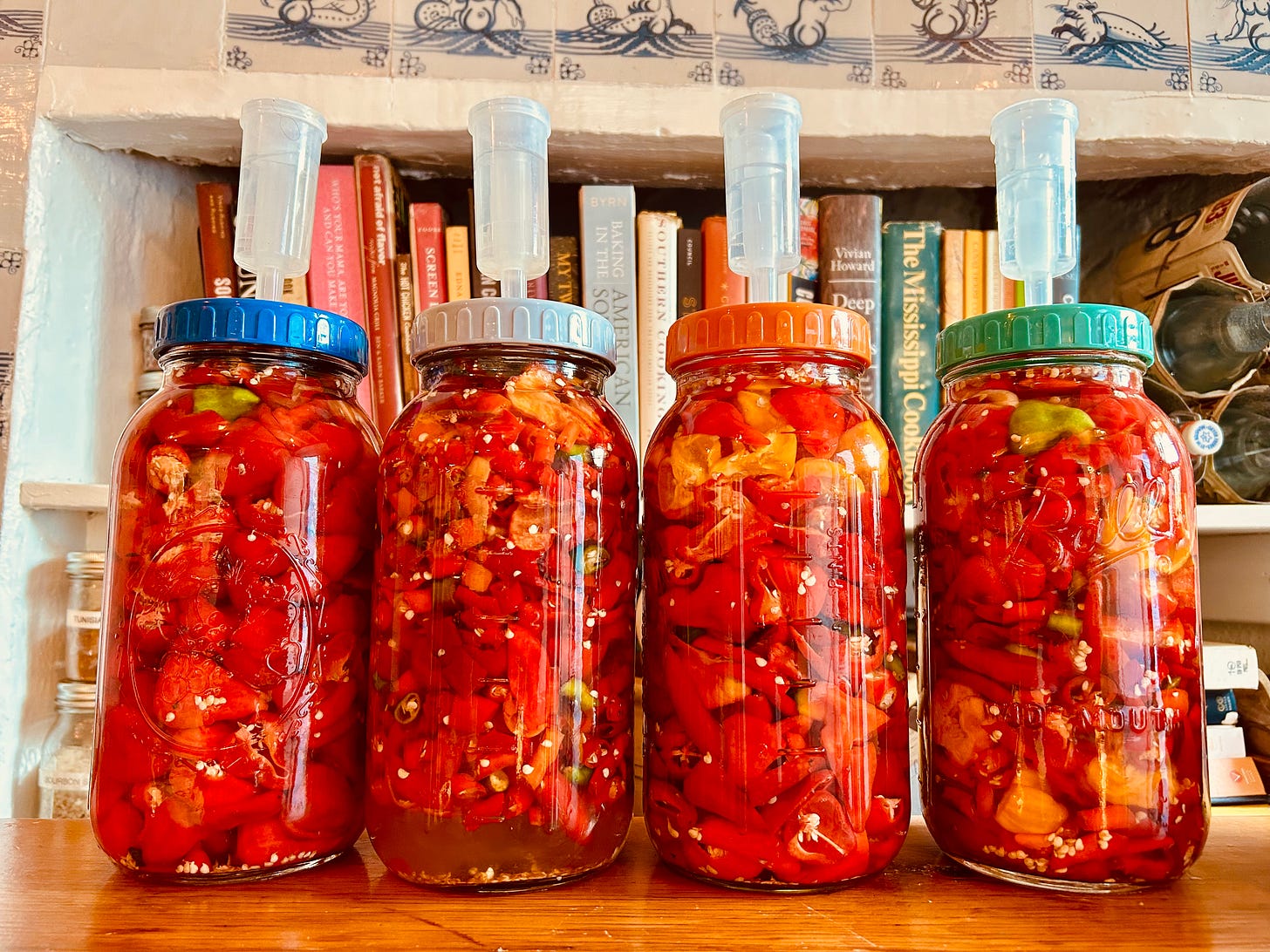





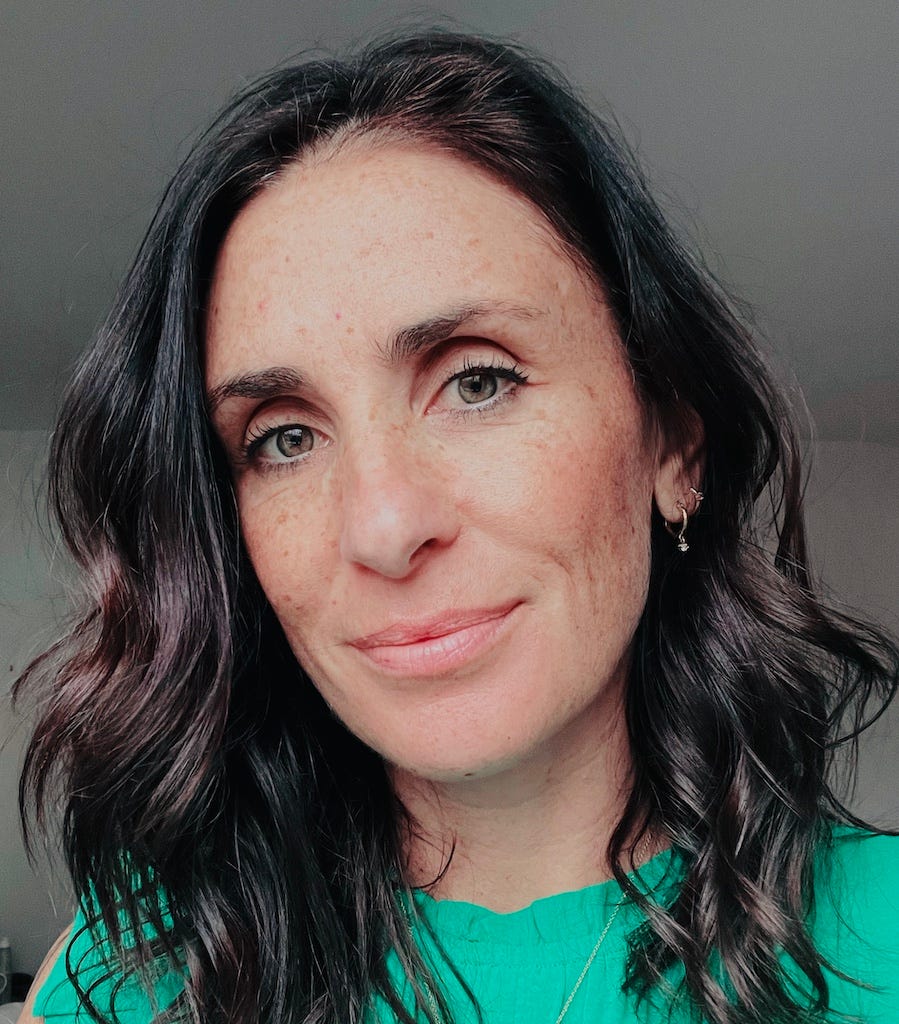

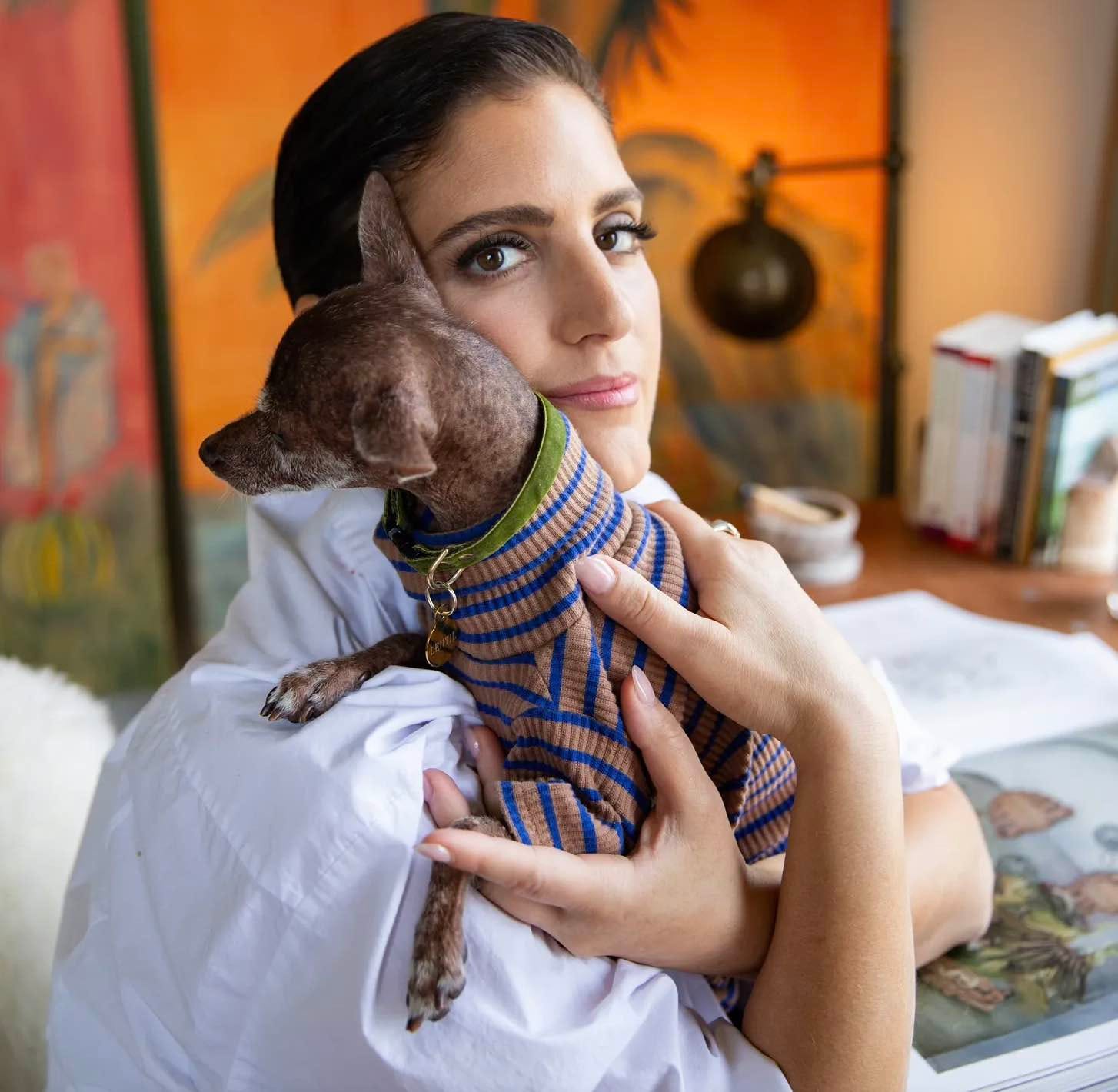
Your great miracle, Besides your brilliance and fortitude, is the wonderful support of friends, family and doggos. I’m sure that all the internal screams of fear and pain are soothed by the love. I see you floating in an ocean of love.
To honor my big 80 last month, I have been on a daily exercise regime. I alternate between 45 minute walks along the country road that passes the Omega Institute, and a free weight and yoga regime. Yesterday I was on my walk. I just passed Omega, clearly not paying great attention because my foot twisted at the edge of the road where it meets the gravel, and I went down onto my hands and knees. Several people immediately came over, two of them were doctors. 😂 Thankfully, I was not badly hurt, (perhaps because of my practice of karate when in my 30s, I learned how to fall). I did scrape up hands, knees, and the corner of my mouth. somebody gave me a ride home and I felt really shook up, my ribs hurt everything hurt. I did not feel sorry for myself, however. I felt grateful that nothing was broken and that in a few days I would be able to get back to my regime, hopefully with more mindfulness. I guess my point is that although my day was changed, I had planned to meet a friend and go on an outing, I was OK. I just lay in bed all day with my two little doggos, and nursed my boo-boos. Thank you for your inspiration. Always good to remember our simple gratitudes.
Good morning Suleika and IJ community. As usual, Suleika, you offer the perfect prompt for this day! Thank you for sharing so intimately ♡ The ways I escape my pain are through eating and working. I can't even imagine giving myself a day on the couch snuggling with my little pooch. I've gained 20 lbs since my daughter Anjelica left this earthly realm, eating expensive and lovely chocolate nearly every single day, followed by hand-crafted espresso lattes from our local coffee shop. I get lost in this combination. Even while Anjelica was at MSK, I would endulge myself every day with a hot latte from the coffee/gift shop, and savor a white chocolate "cannoli" bar (filled with cannoli crunch). And work . . .I went back to work part-time and now I work two jobs, filling all my days with work and a rare day off here and there. What is on the other side of these escapes? Tears, weepy tears, and longing, and sadness. I recently stopped the coffees and chocolate, for my health (and pocketbook). But I still distract myself from my loss with work. When Anjelica first passed, I used to see her sitting next to me and we would talk throughout the day. That was comforting. As time passed and the reality sunk in deeper and deeper (its been over two years now), I noticed that I have unconsciously found ways to stop thinking about Anjelica and the big, dark, empty space in my life that has been left gaping in my very soul. Because I am not numbing my feelings with food, I am emotionally raw. If I sit too long, and just be, I can easily be overcome with sadness, memories and tears. This grief. Who knew, certainly not me. I never ever thought I would lose a child and it's still hard for me to accept. I listened to a great deal of Pema Chodron and her "leaning into the sharp points" while going through my painful divorce years ago. She was a tremendous help to me. But this go-around I seem to be avoiding those razor sharp points for as long as I can, fearful I won't be able to manage the pain and that I might collapse and literally drown in my grief.